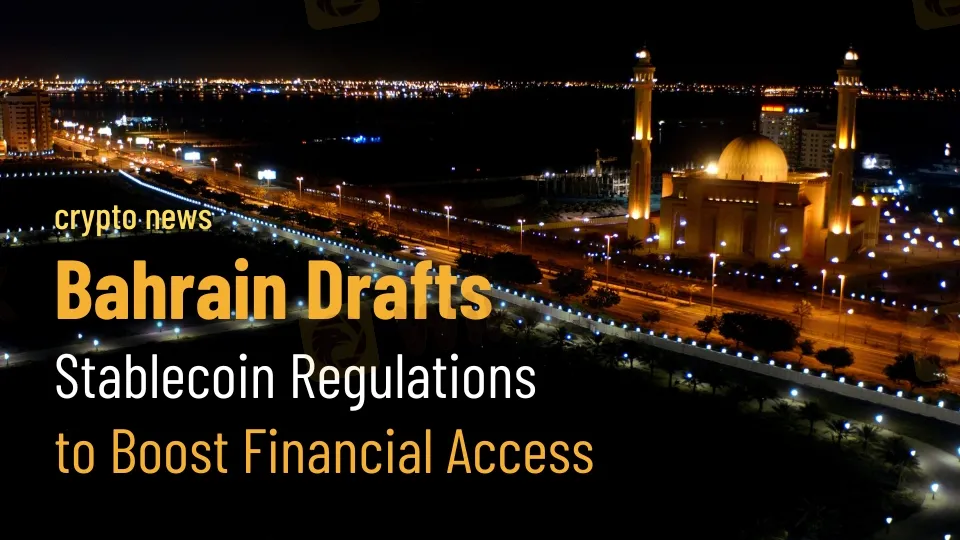简体中文
繁體中文
English
Pусский
日本語
ภาษาไทย
Tiếng Việt
Bahasa Indonesia
Español
हिन्दी
Filippiiniläinen
Français
Deutsch
Português
Türkçe
한국어
العربية
Bahrain Drafts Stablecoin Regulations to Boost Financial Access
Abstract:Bahrain’s central bank is drafting stablecoin regulations to reduce transaction costs, enhance oversight, and expand financial access.

Bahrain is taking substantial measures to regulate stablecoins, which is anticipated to lower transaction costs and increase financial access across the Middle Eastern country. Shaikh Salman bin Khalifa Al Khalifa, Bahrain's Finance and National Economy Minister, has announced that the Central Bank of Bahrain (CBB) is developing laws for the stablecoin issue. This initiative demonstrates Bahrain's commitment to developing a more secure and transparent digital asset ecosystem.
A Safer Digital Asset Environment
During a parliamentary session, Al Khalifa addressed legislator Hisham Al-Asheeri's question on digital asset regulation, underlining the CBB's commitment to protecting investors. “The Central Bank, as the regulatory body concerned with the financial sector, has been keen to enact laws and legislations concerned with regulating services related to crypto assets to provide a safe investment environment subject to the highest standards of oversight,” according to him.
The minister underlined the hazards of unregulated platforms, such as money laundering and fraud. Bahrain hopes to reduce these dangers by implementing stablecoin laws while also supporting innovation in the digital asset market.
Bahrain's Crypto-Friendly Stance
Bahrain has long been seen as a cryptocurrency-friendly country. In recent years, the CBB has granted licenses to major cryptocurrency exchanges such as Coinmena and Binance. This forward-thinking strategy has enabled enterprises like telecom provider Stc Bahrain to accept cryptocurrencies, further integrating digital assets into the country's economy.

Critics claim that the lack of a strong regulatory framework has hindered certain firms from fully adopting cryptocurrencies and stablecoins. The new laws seek to address these issues by allowing the CBB to monitor transactions via blockchain-based monitoring technologies.
Ensuring Compliance
The new legislation will subject licensed crypto firms to severe scrutiny. Administrative fines, service suspensions, and even criminal penalties may be imposed in response to violations. This tight approach is intended to maintain compliance and safeguard investors, bolstering Bahrain's reputation as a safe haven for digital asset innovation.
Broader Implications
The decision to regulate stablecoins is consistent with global trends, as authorities increasingly realize the potential of digital assets to alter financial institutions. Stablecoins, which are linked to stable assets such as fiat currencies, provide a dependable medium of exchange, lowering volatility and expenses.
Bahrain's strong position might serve as a model for other Middle Eastern countries, boosting regional cooperation on digital asset regulation.
Recent Developments in Crypto Regulation
Globally, regulatory activities involving stablecoins and digital assets are gaining traction. The European Union recently concluded its Markets in Crypto-Assets (MiCA) framework, which established detailed rules for crypto service providers. Similarly, politicians in the United States have stepped up discussions on stablecoin legislation, calling for clearer parameters.
In the Middle East, the UAE has emerged as a pioneer in cryptocurrency regulation, establishing the Virtual Assets Regulatory Authority (VARA) to govern the industry. Bahrain's most recent step places it with these nations as a forward-thinking participant in the digital asset field.
Conclusion
Bahrain's draft legislation on stablecoin issuance is an important step toward developing a safe and inclusive financial environment. By fixing legislative loopholes and improving monitoring, the government hopes to attract more firms and investors to its digital asset markets. As worldwide interest in cryptocurrencies develops, Bahrain's proactive approach might serve as a model for other countries grappling with the challenges of digital asset regulation.

Disclaimer:
The views in this article only represent the author's personal views, and do not constitute investment advice on this platform. This platform does not guarantee the accuracy, completeness and timeliness of the information in the article, and will not be liable for any loss caused by the use of or reliance on the information in the article.
Read more

A Must-To-Watch Top Trading Pairs This 2025
Discover the top trading pairs to watch this week, including Bitcoin, Euro, USD, and more. Market trends, key resistance levels, and price movements analyzed.

California Cracks Down on Crypto Scams: 42 Websites Shut Down in $6.5M Bust
California Attorney General Rob Bonta announced earlier this week that the state had taken decisive action against fraudulent cryptocurrency operations. Authorities successfully shut down 42 scam websites responsible for deceiving investors out of at least $6.5 million.

BSP Restricting Offshore Forex Trades to Control Peso Volatility
BSP tightens rules on offshore forex trades, including NDFs, to reduce systemic risks and peso volatility. Stakeholders’ feedback due by March 26.

Ripple Secures Dubai License: First Blockchain Payments Provider in DIFC
Ripple gains Dubai regulatory license, becoming the first blockchain payments provider in DIFC, boosting crypto innovation in the UAE.
WikiFX Broker
Latest News
How to Avoid Risks from Scam Brokers in Forex Investment
Will Trump's Trade Policies Fuel Inflation? BlackRock Warns of Economic Risks
WikiFX "3·15 Forex Rights Protection Day" – Official Release of the Blacklist
Why Scammers Let You Win Before Taking It All
A Must-To-Watch Top Trading Pairs This 2025
Currency Calculator







